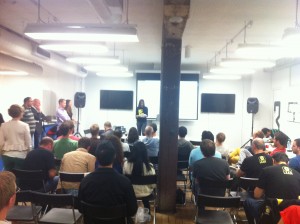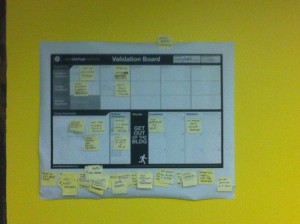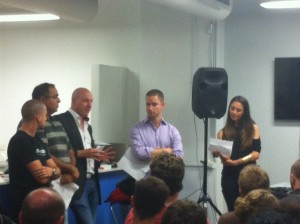
I love the Lean Startup Machine weekend. I took part in their previous one in 2012 at Fishburners in Sydney. You can read more about the process here: http://leanstartupmachine.com/about/ but it’s really about introducing a scientific, no-nonsense approach to rapidly validating or invalidating new business ideas.
My favourite motto from the weekend is “Get out of the building” which basically means: ‘stop talking to yourself and hypothesising what people want and talk to real people and find out’. You also learn about what a hypothesis is and how to test it. One of my majors was the history and philosophy of science so I was used to the concepts when I did it but not used to applying it in the context of startups.
I have a hot desk at Fishburners and you can usually find me on level two most weekends and weeknights. I decided to mosey on down to level 1 to catch the pitches. So having participated in a lean startup machine weekend myself I found it quite interesting to see pitches without having being a part of it.
I’m not personally that interested in pitching myself as it’s usually done in order to attract the interest of investors. Call me odd but I’d rather have traction and metrics and let the investors chase me, so I think the pitch is only useful in forcing startups to clarify their business or when pitching to a room full of interested VCs where you can leverage social proof to get your startup a better deal.
With that said, here are some things that stood out to me that I think people pitching startups need to work on (these are more about style than substance but so is most pitching. A great pitch won’t make up for a bad idea but to ‘win’ at pitching your idea should always be supported by your pitch, not let down by it):
- Project your voice –Too many of the people talking on stage couldn’t be heard. Always project louder than you need to. It’s almost impossible to be too loud so long as you aren’t yelling.
- When answering questions it’s not an invitation to re-pitch – often speakers would start answering the judges’ questions only to trail off on tangents interesting to them and nobody else. Be succinct and direct. If a judge has an unanswered question then that will be a seed of doubt you won’t be able to cast off. You also want to present a focused, clear-eyed image of you and your startup so avoid waffling. So pretend you’re a politician creating soundbites for the six o’clock news and leave some intrigue so that people naturally want to ask you more questions afterwards (don’t be cute, just plant the seed for a bigger conversation).
- For Q&A get your whole team on stage – At least one of the groups had an awkward situation. At the end of the presentation the speaker invited the team onstage but the team leader thought it better for members to stay where they were. As the questions came in from the judges the different team members chimed in from around the room. Another team had the one person presenting strongly at the front but I didn’t even know they had teammates until one of them piped up at the end of Q&A. It gave the image of a very dominant leader (often a great thing) but would have been nice to see all members on stage. It’s not that big a deal in the scheme of things but a united team, shoulder to shoulder, presenting from the front of the room is symbolically great and practically sensible.
- Pitch to the room – A lot of pitches were more story-telling about the weekend rather than taking someone through the important points of your lean startup process. Don’t get me wrong, I love a good story and great pitching and story-telling go hand-in-hand but it should be the story of the business not your personal story of the weekend.
- Slides – Less is More – I know the validation board slide is compulsory for the pitch and I think it’s important that it is it’s own slide rather than shrunk into another slide. I’d rather see more slides with less on them than cramming heaps onto a handful of slides. Then again, there are slide restrictions the Lean Startup Machine has that I may have forgotten about so in that sense the rules for the weekend may not be producing pitches you would necessarily see in front of real investors. Fair enough.
- Pace Well, Finish Early – There was a guy pitching an online kayak (sneaky paddles) rental startup who did this well, he finished under-time which was awesome. Although, it’s not something you can ensure you do during question time as judges may have a lot of questions. Also, talking slower is some often-given feedback at pitching workshops for a very good reason.
- Protect your customer’s privacy – Maybe I’m a bit nit-picky but one team put the emails they’d gotten on a slide. If I’d given my email to a company that did this then I wouldn’t be happy. I know teams are time-strapped but blurring parts of email addresses would have kept the money shot in tact without stepping on privacy.
- Talk to the front of the room –One presenter was facing the side of the room and the projection screen most of the time. Fine if you have a microphone or if you project really well but otherwise detracts from the persuasiveness of the pitch.

Standout Moments
(I’m not going to get the names right so feel free to comment and I’ll update this info, I will even link to your startup website/linkedin profile/blog if you like):
- Sneaky Paddles – I didn’t much care for the business concept myself but the pitch was good in the sense of pacing, projection and finishing under time.
- Boutique Catering – The girl presenting was at place on stage and projected her voice well and exuded a confident and self-assured aura that indicated a pretty inner-directed person, a trait that’s very common amongst successful startup founders. She sounded North American so that might have something to do with her great presenting skills.
- Minute Market – James did a great job of hitting the highlights, explaining the minimum amount so you didn’t get overwhelmed but never so little that you couldn’t follow. It was easy to follow, interesting and you could tell he legitimately cared and really understood the subject matter. He had the kind of passion that made you feel he’d continue to pursue this beyond the weekend, if only to feed his own curiousity. He wasn’t the most polished speaker but that made him all the more endearing (and meant he never came across as salesman like).
- UrbanSpoon for financial planners – The presenter did a great job explaining the startup. He, too, sounded North American and he projected his voice very well, looked at home on stage and used his tonality and body language really well to carry across the concepts. He also did really well at fielding questions and engaging the people asking them.
To be fair, I didn’t tune in through all of the pitches so my account will be incomplete. Having said that a great pitch commands attention in and of itself and whilst there were some good ones none dominated the room and stood out as someone often does at these things.
I remember Josh Rea from Flixy doing that at the Sydney Startup Weekend and he was so persuasive and congruent with his pitch that not only did Flixy sweep it in terms of judge vote but I decided to join up and help them out.
Giving constructive criticism will always make you look like a debby downer but I’m not, in fact, I’m a huge fan of the Lean Startup Machine and think it’s awesome. The nature of all feedback is on what you can improve not what you’re doing right already. The Lean Startup Machine is not for the faint of heart and I think it will give you a really quick way of figuring out if startups are for you or not.
The process mentors are friendly but very firm about keeping you on process and the cameraderie you can get out of it is unbeatable. When I did my weekend I was simultaneously exhausted, exhilirated and energised at the end of the weekend and by the end of it I knew I’d be glad to sign up for the perpetual punishment startups promise from then on.
Judges’ Feedback

After the winners were announced the organisers and judges gave some great feedback. It was really good stuff and they mostly spoke about how the weekend is about learning not necessarily the outcome.
They also spoke about the need to look at business model (after all, startups are essentially the pursuit of growth and the search for a new business model).
I felt the best advice (though all the advice judges gave was great) came from Matt Barrie (You need to have a business model) and Jodie Fox (Your mission should be something you could never fully achieve 100%. For example, her business, Shoes of Prey, has the mission of always being able to find the perfect shoe every time. So you can strive towards it forever, continually make progress but always have ways to improve.)
(Note: I didn’t use quotation marks as I didn’t record their exact words). BTW, I also had a chat to Jodie afterwards and she was super lovely and very approachable – well played Jodie.
The Winners
I’ve deliberated not mentioned who won because I think the focus should be on the process – not the result, and that’s really what the lean startup machine is all about. If there are any “winners” it’s the people who are still doing it the next weekend and the next weekened and the next…
Parting quote (and one you should always have ready at hand to shut down a critic who isn’t involved (ie. most bloggers and journalists)):
The credit belongs to those who are actually in the arena, who strive valiantly; who know the great enthusiasums, the great devotions, and spend themselves in a worthy cause; who at best know the triumph of high achievement; and who, at worst, if they fail, fail while daring greatly, so that their place shall never be with those cold and timid souls who know neither victory nor defeat.
-Theodore Roosevelt

Leave a Reply